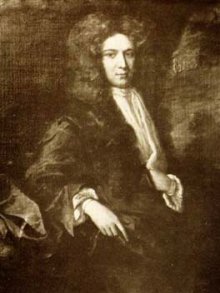Sir Walter Scott knew something about Jonathan Swift,
having written a bio on the author, and adding notes to “The Works of Jonathan
Swift”, published in 1883 by Bickers & Son.
Swift knew something about today’s subject, philosopher Anthony Collins,
who was born on June 21, 1676. Swift’s
Works includes a discussion of Collins’ “Discourse of Free Thinking”. Swift's intro, below, gives a flavor of
Swift’s analysis, and Collins' thinking.
MR.
COLLINS'S DISCOURSE
OF
FREETHINKING;
PUT
INTO PLAIN ENGLISH,
BY WAY OF ABSTRACT,
BY WAY OF ABSTRACT,
FOR
THE USE OF THE POOR.
BY
A FRIEND OF THE AUTHOR.
FIRST
PRINTED IN 1713.
Anthony
Collins, the celebrated Deist, who,
notwithstanding his sceptical opinions, retained the friendship of Locke,
published, in 1713, his "Discourse of Freethinking, occasioned by the Rise
and Growth of a Sect called Freethinkers." It is believed to have been
printed at the Hague, though the title-page bears London. Like Tindal, Collins pretended only to assail the encroachments of the
Pagan and of the Romish priesthood, while his real drift was to undervalue and
bring to contempt the established clergy of all countries and ages, to ridicule
the Mosaical law, to weaken the evidences of revealed religion, and even to
controvert, by insinuation at least, the doctrine of the immortality of the
soul. The treatise attracted much notice, and drew forth an host of answerers,
among whom Whiston, Hare, Hoadley, and Bentley, were most conspicuous.
Swift also mingled in
the controversy, yet rather with a political than a religious view. For,
although the politics of the learned men and divines
above-mentioned were opposite to his own, he has not hesitated, in his ironical
defence of Collins, to
assume the character of a Whig, as if to identify the deistical opinions of
that author with those of the opponents of the Tory ministry. What gave a
colour, though only a colour, to this charge was, that Toland, Tindal, Collins, and most of those who
carried to licence their abhorrence of church-government, were naturally enough
enrolled among that party in politics who professed most attachment to freedom
of sentiment; and in this, as in many other cases, the vices, or
scandalous opinions, of a small part of a political body, were unjustly held up
as its general characteristics. Swift himself had reason loudly to complain of
similar treatment in the succeeding reign, when, because the Jacobites were the
enemies of government, all who opposed the ministry were called Jacobites.
Laying aside consideration of this ungenerous advantage, the treatise is in
itself most admirable…

No comments:
Post a Comment
Note: Only a member of this blog may post a comment.